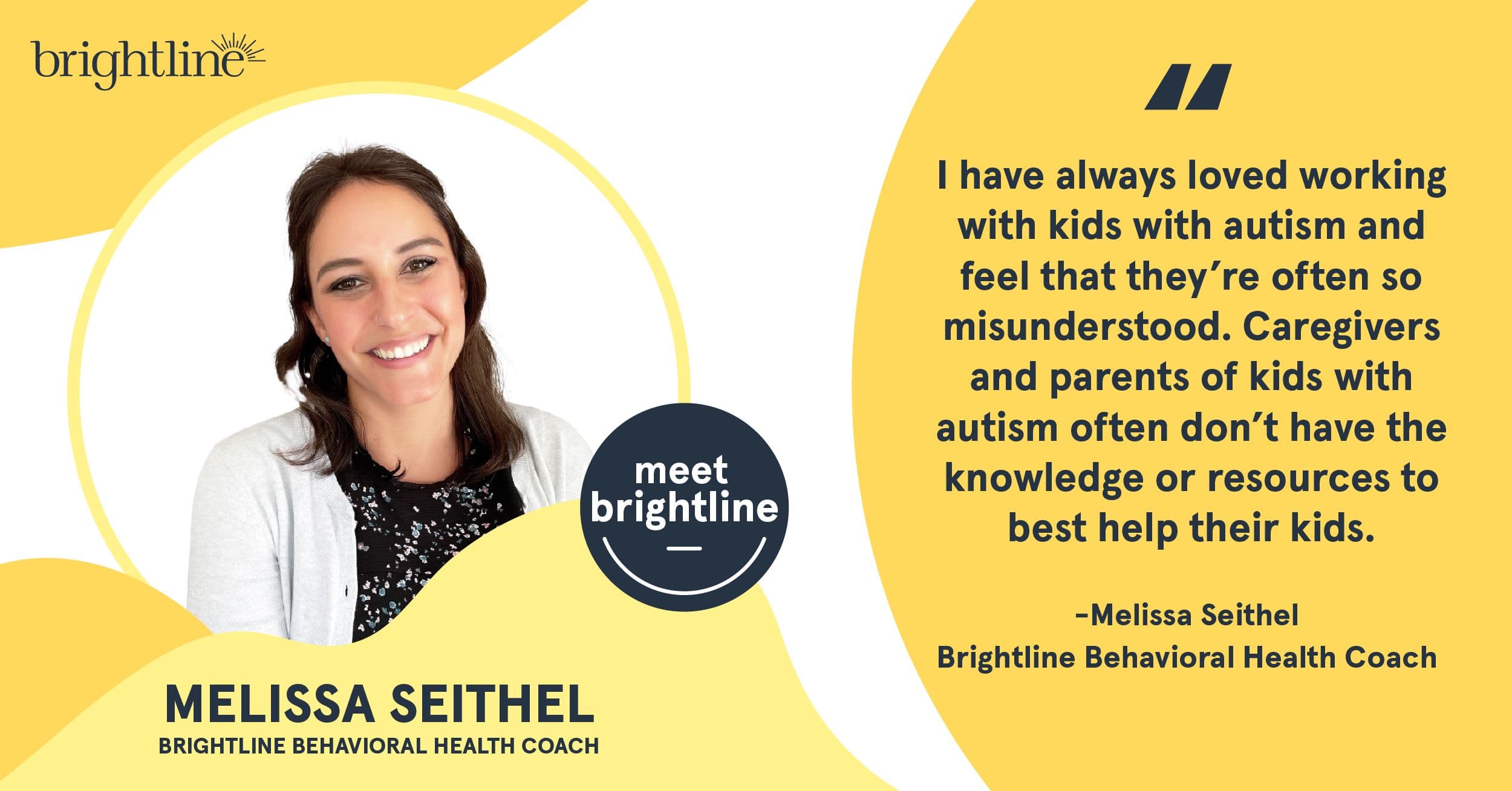“I feel like I’m finally able to truly make an impact in meaningful ways” — Brightline coach spotlight

By Brightline team, Apr 7, 2022
We know that when parents and caregivers are involved in their child’s behavioral health care, the outcomes are almost always better. Unfortunately, there are often challenges in school settings that prevent parents from fully understanding their child’s behavioral health needs.
Melissa Seithel, a Brightline coach, wants to change that. Having previously worked as a behaviorist in a school and as a school psychologist, she became frustrated with this disconnect. She understood that the best way to help kids with behavioral health care needs is to involve parents in their care.
In this interview, Melissa shares her personal story. She tells us why she was inspired to seek a career in children’s behavioral health care, and why she’s passionate about helping kids and teens through Brightline’s coaching program.
What inspired you to pursue a career in children’s behavioral health?
I’ve always been fascinated by science and the brain. When I was in high school, I read a book about neuroplasticity and the concept that the brain is not completely hardwired – you can actually rewire your brain.
Growing up, I faced a lot of challenges and stress and felt that I would always be handcuffed to my past traumas. So when I majored in neuroscience in college and learned that, with practice, you can rewire your brain to promote mental health, I felt like there was light at the end of the tunnel.
I’ve always had a passion for working with kids and families, and pursuing a career in children’s behavioral health felt like the perfect integration of my passion for kids and my knowledge of neuroscience.
What brought you to Brightline?
I had worked as a behaviorist at a school, and more recently as a school psychologist. But I often felt like I was spinning my wheels. There’s a real breakdown in communication in school settings that prevents kids from getting the help they really need. Everyone is told to stay in their lane, and there’s no effective way to involve parents in their child’s care. I realized there had to be a better way to help kids.
When I came across Brightline and saw Brightline talks specifically about the disconnect in the system, it really resonated with me. I felt that if you could build a bridge to bring everyone together to rally around a child’s mental health, that’s how you’ll see strides in kids and teens. I loved that Brightline saw it the same way.
How has your experience working in schools made you a better coach?
My past experiences taught me that if you can bridge that gap and get parents involved in their kid’s care, it can make all the difference.
At Brightline, I’ll typically meet with the parents for a few minutes at the beginning of a coaching session, and then I’ll bring them back at the end to talk about what we went through in our session. I can tell parents how to reinforce behavior, I can send them educational handouts to read through, and I can communicate with them via chat between sessions. This helps ensure that kids get the consistency they need at home – and that often translates in the school setting.
Involving caregivers into their child’s care is such a huge piece of the puzzle for kids and teens, and I love that I get to do that through coaching. It’s so fulfilling to see caregiver involvement pay off and see a child improve.
Tell us a bit about your experience working with children with autism
When I was a behaviorist in the Bay Area, about 97% of the kids at the school I worked at had autism. I have always loved working with kids with autism and feel that they’re often so misunderstood. Parents of kids with autism often don’t have the knowledge or resources to best help their kids.
Can you tell us about Brightline’s upcoming new program for parents of young autistic children and why you’re excited about it?
Brightline is [launching a program] soon to support parents of kids with autism between 18 months and six years old, and I’m so excited about this new resource. It encompasses skill-building, psycho-education, and support from a dedicated care team for parents to learn how to best support their child. Coaches really personalize the support they provide in each session to the unique needs of each family. Plus, even between coaching sessions, the program continuously reinforces new skills through hands-on practice.
When I was working in school settings, I saw parents who had defeat just written all over their faces. They just needed help, but didn’t know how to get it. This program will be a real game-changer for parents looking for some tools and structure for how to support their children with autism, and they’ll finally be able to get that support that most parents don’t have. They’ll learn that they’re not alone.
Having worked with children with autism and their parents in the past, I’m so grateful to be able to bring this level of support to them. I feel like I’m finally able to truly make an impact in meaningful ways. I’m so glad that Brightline has given me this opportunity.
Melissa Seithel is a behavioral health coach at Brightline. She holds a B.S. in neuroscience psychology and an M.S. in school psychology, as well as certifications in applied behavior analysis and neurofeedback.